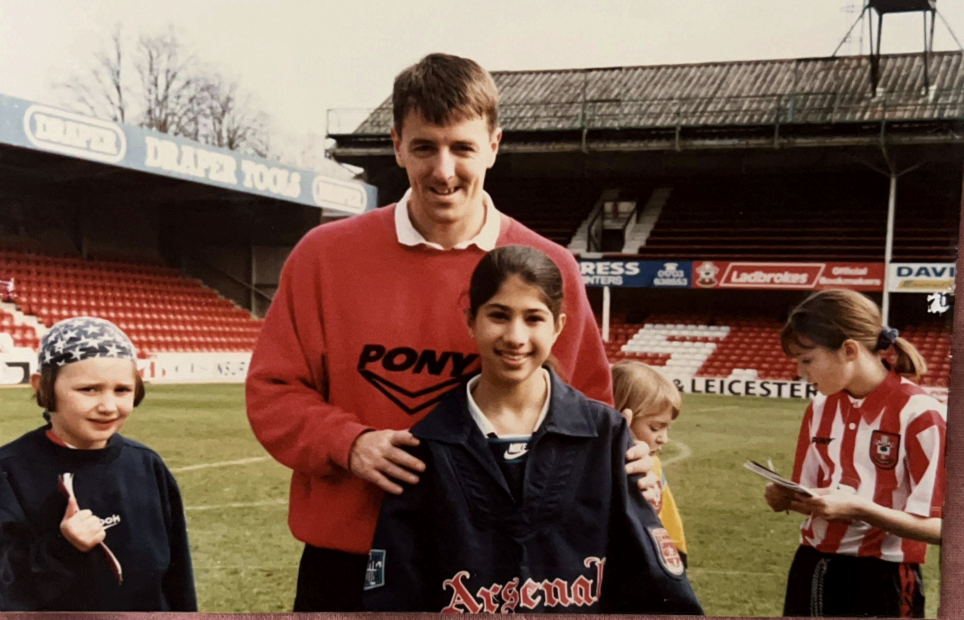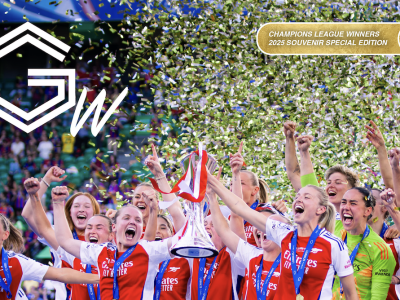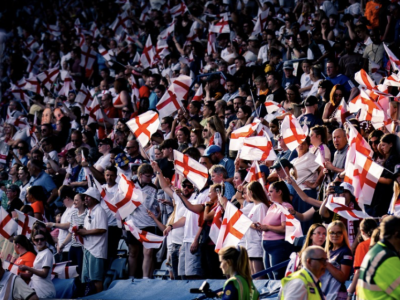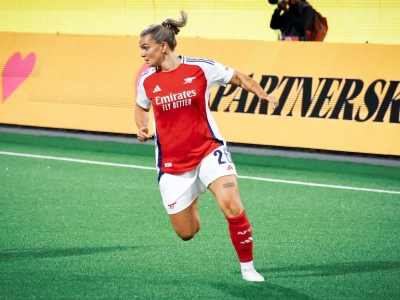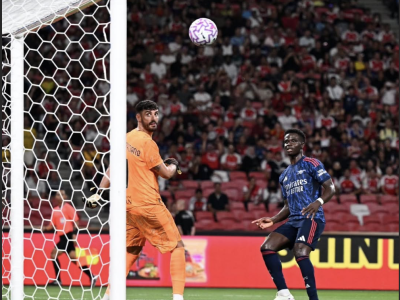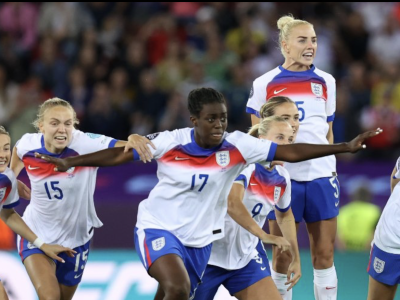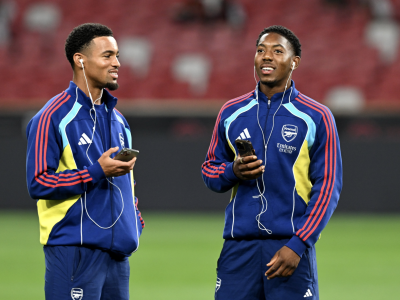I spoke with Aman Dosanj, a former women’s footballer who is credited with being the first person of South Asian descent to play for England and Arsenal. Nowadays she’s a freelance writer, specialising in food, culture, and more recently, sport.
Aman shared her thoughts on a range of subjects from the surge in attention on the women’s game and her childhood support of Arsenal, to the reasons she ultimately walked away from football. Aman is a massive Gooner, and a footballer who deserves her flowers. She answered my call wearing the third shirt from the 24/25 season.
Growing up as an Arsenal fan
“My older brother wanted a brother, so we were constantly in the garden playing football, playing cricket. He just used to stick me in goal and fire shots at me.
“My whole family became Arsenal fans. My Grandma, who didn't really speak English, or read or write or anything like that, watched the football with us… She knew when David Seaman was wearing an England shirt versus an Arsenal shirt, she had cute nicknames for the players.
“It was the era of Ian Wright, Paul Merson and Tony Adams, she knew them all! One of my biggest childhood memories is us as a family watching the games.
“I was the kid in the Southampton set up, always rocking up to the Dell in Arsenal kit. I've got a picture with me and Matt Le Tissier but I’m wearing an Arsenal top. We’d get tickets to watch the games in the Saints section and I would be head to toe in an Arsenal tracksuit. I'm a kid, what? You gonna beat me up?
“Then we moved house and we were so close to the Dell. So, as a 12-year-old onwards to be playing [football] in the garden with your brother and then hearing all the oohs and the ahs and the Saints chants, you grew up thinking that they were cheering for you. I think that was such a brilliant thing to have as a kid.
“So [later] when we started doing exhibition games at the Dell, it was just normal. It felt like it was meant to be.”
Sue Buckett, former Southampton and England goalkeeper and legacy cap no.1
“She was literally like, ‘She wanted to go in goal and I don't even know why.’ I think it’s the most intelligent position on the field, because you see everything. But now I think I just liked people to kick a ball at my head because of the dopamine hit.
“Sue asked to speak to my Mum, and I thought I was in trouble. Then she said, with the right encouragement and training, I think she can play for England. And game knows game, right?
“Sue was incredible and just wanted me to succeed and have all the opportunities [she] didn’t have.”
Playing for Arsenal
“You never really know about the history making aspect of it as a 14-year-old, you don't really think oh, I'm the first Indian, that perspective comes later. People always like to focus on the England achievement, but I think the Arsenal achievement for me was bigger because I was playing with full internationals.
“Vic Akers was amazing because he didn’t give a s*** about my height. [It wasn’t a barrier]. We had Faye White, who was a giant, next to Vicky Exley, who was probably smaller than me.
“For training, my Mum would pick me up from school, we’d go home quickly, eat, get changed, go to Southampton Central Train Station. From there, it's an hour and a half to London Waterloo, from there it’s half an hour to Arsenal Tube Station.
“From there, it's a ten minute walk, and then you start running, and you're in the ball court. My dad would pick us up after work in the city. We’d drive back home during GCSEs, [which was] a crazy schedule. But I was never gonna say no to playing for Arsenal.
“Rachel Yankee nutmegged me in my very first arsenal session in the ball court. And I just smiled about it because it was just Rachel Yankee doing Rachel Yankee things. It was very humbling playing against someone like [that], [or later] Sue Smith, because I was this whizz kid and she rattled my crossbar four times.
“There was no money in the game. I think people don't realise that. I tried to get a boot sponsor and a glove sponsor. I got rejected by Nike, Adidas…all of them. It didn't matter that I was the first South Asian or anything, even after England.
“[Now] I get asked for tickets and shirts. I've literally just got the one Arsenal shirt I played in, that's it. You can wedge the door open for others, but you don’t necessarily get afforded the same privileges as the next people benefiting from it. And that kind of happened with Sue [Buckett], but it’s important for me to showcase her story and her role within my story as well.”
Erasure in the women’s game
“Our timeline didn't start with Rachel Yankee. From Copa 71, where there were a hundred thousand people in Mexico watching games. Yes, Arsenal are pulling in record crowds, so [are] Barcelona now, but I think the women's game has always been stop-start. From a South Asian perspective as well, because people always talked about us as if we've never existed in the game when we have.
“I think storytelling is the best thing that we can do. It would be nice sometimes if the facts were right and that people weren't looking at just Wikipedia, like we can't ChatGPT our way through representation on a football pitch.
“Over the years what's been a bit of a mindf*** is that you get erased. Like, I was so prominently working with Kick It Out and the FA. Then for reasons unknown things just dropped off and it disappeared.”
Leaving Arsenal and getting injured
“I left Arsenal because I had a scholarship to go to the States. When I got there it wasn't the best in terms of education, or the level of football. I like to trust my intuition. I knew it wasn't the best place for me, so I made the call to come back.
“Once you get to university and you’re trying to juggle it [with football], it’s just really hard and I was trying to pay for things. Then I got an ankle injury that ruled me out for a whole year. I didn't have a team. So if I didn't have a team, then the physio was all on me.
“The knee injury was what cut the dream short. At the time there wasn't much research. No one ever asked me about the menstrual cycle or anything like that. They didn't know what was going on. It felt like, you know, when you've got one of those resistance bands [on your ankle].
“There were certain movements that just felt like it was stretching. I could walk, but there were movements where it just felt like something was about to snap. That was it really. It was never the same after the op. I was also that stubborn kid that was like, if I can't play for England then I’m not going to play. My goal was to obviously play for the senior team and play in World Cups and that wasn't necessarily going to be a reality anymore.
“I think it would've been different if [I’d] had facilities that we do now and the resources available like a proper physio. We [also haven’t had] conversations about neurodivergence in the game. Only now are we having those conversations.
“That was really difficult. I was [only] diagnosed with ADHD and other things last year. So that has already given me a different perspective, because it can be very lonely with injury at the best of times. We've seen, [Viv] Miedema, Beth Mead [and others] talk about, you know how they're segregated from the rest of the team. But imagine not having any of those systems in place.”
On the growth of the women’s game
“I was in the crowd when Arsenal lifted the Champions League the first time around, so it was special to watch it again - this time at the Emirates. It’s great to see the growth of the game, from the highest level, from the WSL, [to the] Euros, [to the World Cup]
“But we are still having the same conversations, right?
Scarlet: “You are a walking advert for this kit right now.”
Aman: “Yeah. Which I paid for.
But it's always been like that, right? I [didn’t necessarily benefit] from anything in my football career other than obviously it happening.
We still have the same obstacles with people saying that they don't have access to girls teams or [not being able to] play in schools. Back in the mid nineties [that] was all available to me. It's crazy. Use this (my story) as a story of what if all the right conditions are there?
“If I had the talent and wanted to do the work, and I worked hard to get there. Even though I'm downplaying it, but you know, the gymnastics sessions afterwards, I was literally bouncing for an hour just so I [could] improve my agility and, and my height wasn't as much of a barrier [as it could’ve been].
Celebrating your achievements
“Over the years I've learned to give myself more credit for it because… I was wedged between Sarah Reed who was an England International and amazing, and Emma Byrne, who in my opinion is the greatest Arsenal goalkeeper in all of our history.
“It’s become this thing where I’m like did I do that? Did I actually play for Arsenal and England? I was invited to the Liverpool game and I saw Rachel [Yankey] and Faye [White]. They recognised me, and it was like, oh yeah I did do that.
“I am super proud of it. And [the gratitude] goes to Clare Wheatley, it goes to Vic Akers, to Sue Buckett. They’d never seen a South Asian playing before but my talent shone and they saw what I could do. That’s priceless.”

